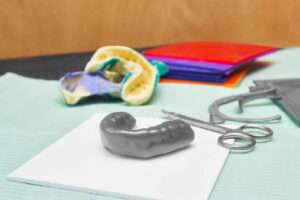Most of us have had moments where we notice something tastes a bit off. Maybe it feels like you’ve been chewing on a penny or you keep catching an odd tang that just won’t go away. While it might sound strange, a metallic taste in your mouth is actually pretty common, and it can come from a surprising number of causes. At Fernandez, DMD, we believe it’s important to understand what your body might be telling you, so let’s explore why this happens, what might be behind it, and what you can do next.
What a Metallic Taste Really Means
When people describe a metallic taste, they’re usually referring to a lingering flavor that resembles iron, blood, or copper. It can be subtle, noticeable only when you’re eating or drinking, or it might be strong enough that you taste it all the time. This sensation even has a name: dysgeusia, which means a distortion or change in your sense of taste. While it’s rarely an emergency, it can still be frustrating or even worrying, especially if it sticks around.
Common Causes That Start in the Mouth
One of the first places to look when trying to figure out why you have a metallic taste is right inside your mouth. Your oral health can play a big role in how things taste, and here are a few dental-related reasons you might experience it:
- Gum disease or infection: Conditions like gingivitis and periodontitis can cause bleeding gums, which may leave you tasting blood, especially after brushing or flossing.
- Dry mouth: Saliva helps wash away food particles and bacteria. If your mouth feels dry, you may notice a strange taste because those particles linger.
- Dental work: Some fillings, crowns, and bridges contain metals like amalgam, which can sometimes give off a mild metallic taste, especially if they’re aging or breaking down.
- Poor oral hygiene: Plaque buildup and trapped food can also cause an unpleasant taste, including metallic notes.
Mouth sores: Ulcers or other irritations can bleed slightly, which you might taste.
If the taste appeared around the same time you noticed bleeding gums, increased plaque, or new dental work, it’s a good idea to bring this up with your dentist. A thorough cleaning, adjustment, or exam may be all it takes to solve the problem.
Other Medical Reasons
While oral health is often the starting point, there are many other reasons why you could notice a metallic taste. Some are temporary, while others may need a bit more attention.
- Medications: A very common cause is medication. Antibiotics, antihistamines, blood pressure pills, and certain antidepressants can all list taste changes as a side effect. Even over-the-counter multivitamins, especially those high in iron, zinc, or copper, can cause this taste.
- Infections: Sinus infections, colds, and upper respiratory illnesses can affect your sense of taste and smell. Because smell plays such a big role in taste, any congestion or inflammation can lead to odd flavors, including metallic notes.
- Pregnancy: Hormonal changes during pregnancy, especially in the first trimester, can make some foods taste metallic or sour.
- Vitamin or mineral imbalances: Both too much and too little of certain nutrients, like zinc or vitamin B12, can change how food tastes.
- Acid reflux: Stomach acid can creep up into your throat and mouth, sometimes leaving a bitter or metallic taste.
- Allergies: Seasonal allergies can cause postnasal drip, which can also bring an unpleasant taste.
- Neurological conditions: Rarely, conditions that affect nerves involved in taste and smell can change how you perceive flavors.
- Metal poisoning: This is very rare but possible, especially with heavy metals like lead or mercury.
Because the list is so varied, it helps to notice when the taste appears, whether it’s constant or comes and goes, and if it coincides with other symptoms. This can help your dentist or doctor narrow down the possible causes.
Lifestyle Factors You Might Not Realize Matter
Sometimes, everyday habits can also contribute to this metallic taste. For example, smoking can change your taste perception and dry out your mouth, both of which can add an odd metallic edge. Drinking a lot of coffee, chewing certain gums, or eating acidic foods may do the same, especially if they irritate your gums or stomach. Even dehydration itself can make tastes seem stronger or stranger because your body isn’t producing enough saliva to keep your mouth clean and balanced.
When Should You Be Concerned?
While a metallic taste is often harmless, there are times when it’s best to seek professional advice. If the taste lasts longer than a couple of weeks without any obvious cause, appears alongside pain, swelling, difficulty swallowing, or changes in your tongue or gums, it’s a good idea to see your dentist first. They can check for infections, gum disease, and issues with dental work. If nothing dental explains it, you may be referred to your primary care provider for further testing.
Other warning signs to watch for include unexplained weight loss, numbness, persistent dry mouth, or new neurological symptoms. These don’t necessarily mean something serious is wrong, but it’s worth ruling out more significant conditions.
What You Can Do in the Meantime
While you’re waiting to see your dentist or doctor, there are some practical steps you can take to reduce or manage the metallic taste:
- Brush and floss thoroughly twice a day to remove plaque and food particles.
- Use alcohol-free mouthwash, which may help freshen your mouth without making dryness worse.
- Stay hydrated by drinking water throughout the day.
- Chew sugar-free gum or suck on sugar-free mints to help stimulate saliva.
- Avoid smoking and reduce foods that may irritate your mouth, like very spicy or acidic dishes.
If you suspect medication is the cause, don’t stop taking it without talking to your doctor. Instead, ask if there are alternative options or if the side effect might fade over time.
For pregnant individuals, know that this usually improves as hormone levels stabilize later in pregnancy.
Treatment Depends on the Cause
Because so many different things can lead to a metallic taste, treatment will depend on identifying what’s behind it. If gum disease or a dental infection is to blame, a professional cleaning, scaling and root planing, or other treatment can help restore your oral health and your sense of taste. If an aging metal filling is involved, your dentist might recommend replacing it.
When the cause lies elsewhere, like medication or reflux, managing the underlying condition often makes the taste go away. Even small changes, like adjusting your diet or drinking more water, can sometimes make a surprising difference.
Why It’s Important Not to Ignore It
While most cases are harmless, a persistent metallic taste can still impact your quality of life. Food might not taste right, which could affect your appetite or nutrition. More importantly, it can also be a sign of something your body is trying to alert you to, like gum disease or an infection. The earlier these conditions are caught, the easier they are to treat.
Partner With Your Dentist
If you’ve noticed a metallic taste that just won’t go away, your dentist is an important first step. At Fernandez, DMD, we see patients every year with concerns about changes in taste, and we understand how unsettling it can be. During your visit, we’ll look for signs of gum disease, check existing dental work, and ask questions about your medical history, recent illnesses, and medications. By piecing together the details, we can help guide you toward the right solution or refer you to a specialist if needed.
Final Thoughts
A metallic taste in your mouth can seem odd or annoying, but it often has an explanation that’s treatable or temporary. Paying attention to when it happens, along with keeping up your oral hygiene, can help you and your dentist get to the root of the issue faster. If you’re experiencing this or any other changes in taste, don’t hesitate to bring it up at your next appointment.
At Fernandez, DMD, we’re here to help you feel comfortable, informed, and confident in your oral health. If you have questions about a metallic taste or anything else related to your dental care, give us a call to schedule an appointment. Together, we’ll help keep your mouth healthy and your smile tasting just the way it should.





